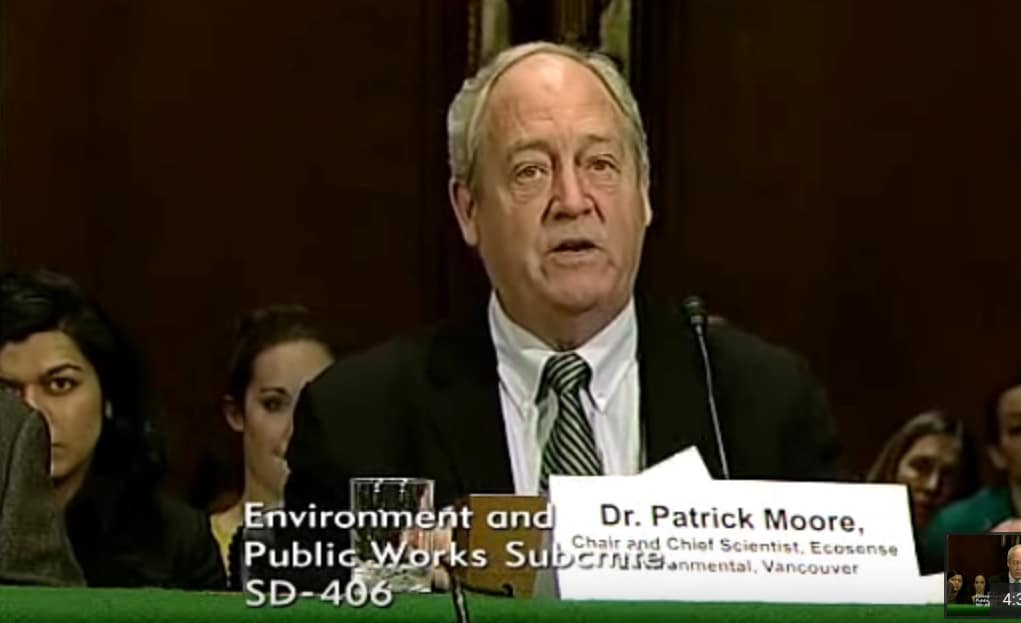Climate science denialist Patrick Moore is all about “consensus building.” We know this because it says so on his biography at the think tank Frontier Centre for Public Policy.
And so, fresh from delivering a coal-funded talk in Brussels where he told the audience to “celebrate CO2”, the Canadian has been out doing a bit of that “consensus building” in his own unique way.
In recent days, Moore has accused respected climate scientist Ken Caldeira of “fakery”, called him a “jerk” and then told a fellow nuclear power advocate to “GFY”.
The nuclear advocate in question was Australian energy and climate consultant Ben Heard, who had engaged Moore on social media. He’s written a blog about the exchange.
British environmentalist and author Mark Lynas, who is also pro-nuclear energy, weighed in too, describing Moore as “just a predictable right-wing anti-green contrarian”.
When DeSmog UK gave Moore the chance to respond to a story showing he had been paid by coal lobbyists to deliver a talk, his response was “bugger off”.
Who is Patrick Moore?
For those that don’t know, Patrick Moore is often described as a former senior member of Greenpeace, even though he left that organisation 30 years ago.
Since then, he has spent his time being an advocate for nuclear power, GM crops, forestry and, apparently, burning as much coal as you can get your hands on.
In a French television interview last year, Moore told a journalist that the pesticide glyphosate was not a carcinogen and was so safe, “you could drink a whole quart of it and it won’t hurt you”.
Moore was then immediately offered the chance to drink a glass by the interviewer, which he declined. “I’m not an idiot,” he said.
Moore is a long-time climate science denialist and claims, against all credible scientific institutions, that there is “no proof” that the extra CO2 in the atmosphere (about 40 per cent more than there was before the industrial revolution) is causing any global warming.
Acidification denial
In April 2015, Moore wrote a column for The Australian newspaper claiming that ocean acidification, caused by adding CO2 to the atmsophere mostly from burning fossil fuels, wouldn’t be a problem for the oceans and the species that live in them.
In typical conspiratorial style, Moore even claimed the science of ocean acidification had been “invented” around the year 2005.
Moore has no academic publishing record at all on ocean acidification (or much else in the last 20 years), so it was no surprise that he got things badly wrong.
Several of the world’s leading scientists on ocean acidification, including one who had apparently begun studying the issue a whole five years before it had even been “invented”, tore Moore’s claims to pieces.
Moore’s column was “ill informed and highly misleading”, “very wrong”, “BS” and “nonsense”, the scientists told me for The Guardian, who explained in painstaking detail why his analysis was flawed.
But this didn’t stop Moore making the same claims in a subsequent research paper ”Ocean ‘Acidification’ Alarmism in Perspective” for the Canada-based Frontier Center for Public Policy (FCPP), where he is chair of the think tank’s “Energy, Ecology and Prosperity Program”.
Oddly, the paper carried a disclaimer that the views expressed “do not reflect the opinions” of the center, “its Board of Directors, staff and/or donors” despite it being written by one of its own.
According to FCPP, its papers are “rigorously researched by the most credible experts in their field”. They also claim to run their own “peer review” system for their reports.
This is just as well, because Moore thinks that actual peer reviewed scientific journals are ruled by a “warmist ideology”.
This appears to be a pattern for Moore. When challenged, respond with a mixture of abuse, name-calling and conspiracy theories.
So when a group of students walked out of a speech he gave at a US college last year, he compared them to the “taliban”.
There’s Moore’s “consensus building” skills on display again.
Image: Patrick Moore gives evidence to the US Senate Committee on Environment and Public Works, February 2014
Subscribe to our newsletter
Stay up to date with DeSmog news and alerts







